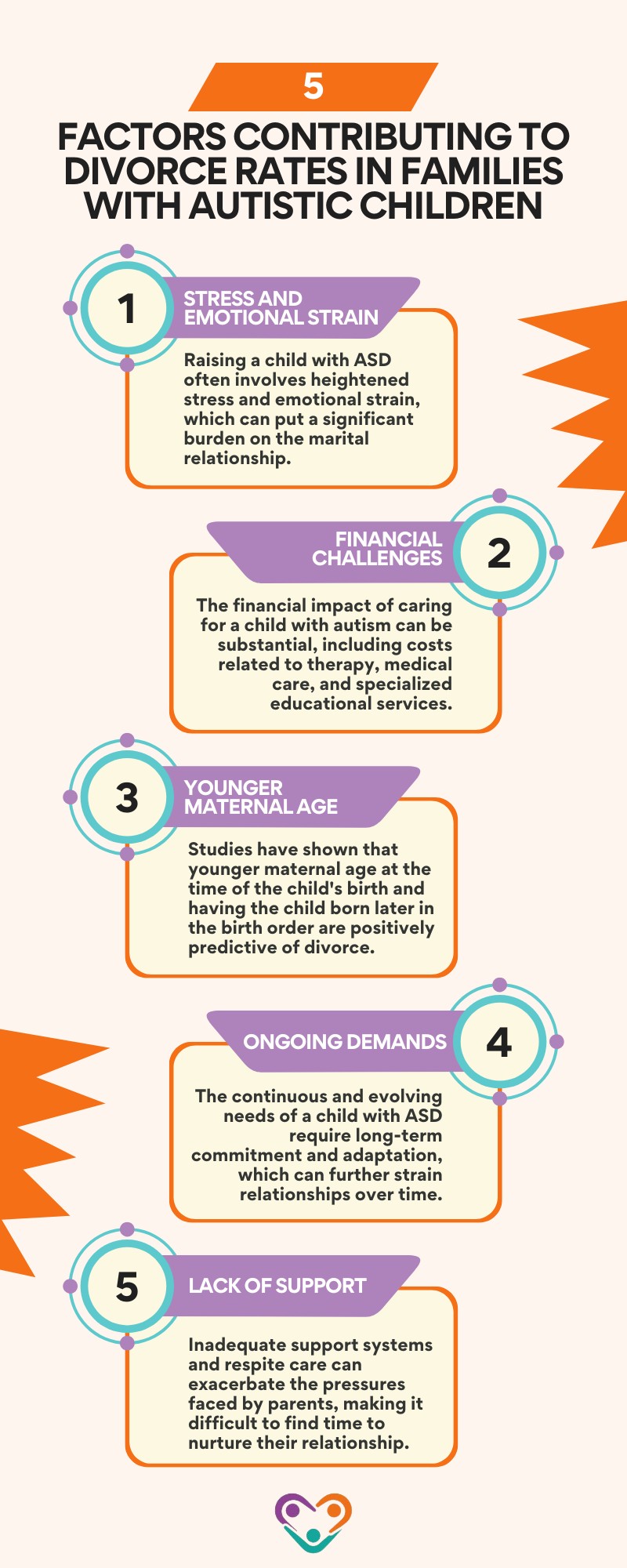Relationships can be challenging, and for couples navigating the complexities of autism, those challenges may feel even more pronounced. The stress, communication hurdles, and emotional complexities that can arise often lead to a higher risk of divorce. However, available support and programs can provide valuable tools and resources to help couples strengthen their bond and manage these difficulties more effectively.
Understanding how autism influences marital dynamics can shed light on why divorce rates are notably higher for couples where one or both partners are on the spectrum. These unique pressures, combined with societal misconceptions and unmet needs, can make it harder for relationships to thrive, even with the best intentions.
Impact of Autism on Families
The presence of autism in a family significantly impacts the dynamics, often bringing unique challenges that can strain relationships. Parents of children with autism frequently report higher levels of stress and anxiety due to the constant need for vigilance and care.
This heightened stress can affect marital satisfaction and, in some cases, may contribute to a higher rate of divorce.
Research indicates that parents of children with autism face a divorce rate of about 23.5%, compared to 13.8% for parents of children without disabilities. This elevated rate of separation can be attributed to multiple factors, including the emotional and financial strains associated with raising a child with autism.
Additionally, certain factors have been identified as predictors of divorce in families with an autistic child.
Younger maternal age at the time of the child’s birth and the child being born later in the birth order are linked to a higher likelihood of divorce. The persistent challenges of parenting a child with autism extend into the child’s adolescence and early adulthood, maintaining the divorce risk until the child reaches about 30 years of age.
The intricacies of raising a child with autism require a strong support network and a proactive approach to stress management. Recognizing these factors can help families navigate the complexities of autism while maintaining strong, resilient relationships.
Divorce Rates in Families with Autism
The divorce rate among families with a child diagnosed with autism spectrum disorder is a critical area of concern. Studies have shown that these families experience higher divorce rates compared to families without a child with disabilities.
Here’s a look at the divorce rates across different family types:
- Families with a child with disabilities: Up to 87%
- Families with a child with autism: About 80%
- Parents of children with autism: 23.53%
- Parents of children without disabilities: 13.8%
Surveys indicate that the prevalence of divorce in families with a child who has autism is significantly higher than in those without disabilities. Parents of children with autism continue to face a heightened risk of divorce through various stages of their child’s development, including childhood, adolescence, and early adulthood.
That said, several factors contribute to the increased divorce rates in families with a child who has autism. These are as follows:

Understanding these factors is key to developing strategies to provide better support to these families, ultimately aiming to reduce the divorce rate among parents of children with autism.
Challenges Faced by Parents
Parents of children with autism face numerous challenges that can take a toll on their emotional, financial, and overall well-being. Two primary challenges include stress and support, as well as financial strain.
Stress and Support
Caring for a child with autism often involves high levels of stress due to the demanding nature of the disorder and the need for constant attention and care. Parents may find themselves managing a variety of tasks, from attending therapy sessions to dealing with behavioral issues.
Stress can also arise from a lack of adequate support. Many parents feel isolated and struggle to find resources or respite care, which can offer temporary relief. The lack of social support can exacerbate the emotional and mental strain, making it difficult for parents to cope effectively.
Financial Strain
The financial strain of raising a child with autism is another significant challenge that parents face. Specialized therapies, medical treatments, and educational resources can be costly, adding additional pressure on families.
The financial burden can also be compounded by the need for one parent to reduce work hours or quit their job entirely to provide full-time care for the child. This loss of income can further strain the family’s financial stability.
Unique family characteristics, such as maternal age at childbirth and birth order, are significant predictors of divorce for parents of children with autism. The financial strain associated with these factors can contribute to higher divorce rates among these families.
Parents of children with autism experience a unique set of challenges that can significantly impact their lives and relationships. Understanding these challenges is crucial for providing the necessary support and resources to help families navigate them effectively.

Long-Term Impact on Children
Children in families experiencing divorce, particularly when autism is a factor, often face heightened emotional challenges. The added stressors and changes in family dynamics can exacerbate feelings of uncertainty and anxiety.
Some common emotional impacts include:
- Increased feelings of isolation
- Higher levels of stress and anxiety
- Difficulties in social interactions
- Potential behavioral changes
Providing emotional support through consistent routines, therapy, and open communication is vital to mitigating these effects. Emotional well-being can be fostered through family therapy and support groups tailored to families with autism.
Parental involvement is also crucial in supporting a child with autism, especially during and after a divorce. The stability and active engagement of both parents can significantly influence the child’s development and emotional health.
Factors affecting parental involvement include:
- Custody arrangements
- Consistency in routines and approaches to care
- Communication between parents
Research indicates that having a younger maternal age at childbirth and children born later in the birth order are predictive factors for divorce in families with children who have autism. These factors can lead to variations in parental involvement post-divorce, impacting the child’s stability and support network.
Understanding these long-term impacts and addressing them proactively can help mitigate the challenges faced by children in families dealing with autism and divorce. At Golden Care Therapy, we offer expert ABA therapy in Florida, New Jersey, Indiana, New York, and Georgia.
Our dedicated team works closely with each child and family, providing personalized care and proven strategies to foster growth and development. We believe in the power of early intervention and tailor our services to meet each child’s unique needs.
If you’re looking for professional support, don’t hesitate to reach out to us today. Contact us now to learn more about how we can help your child thrive.
Sources:



